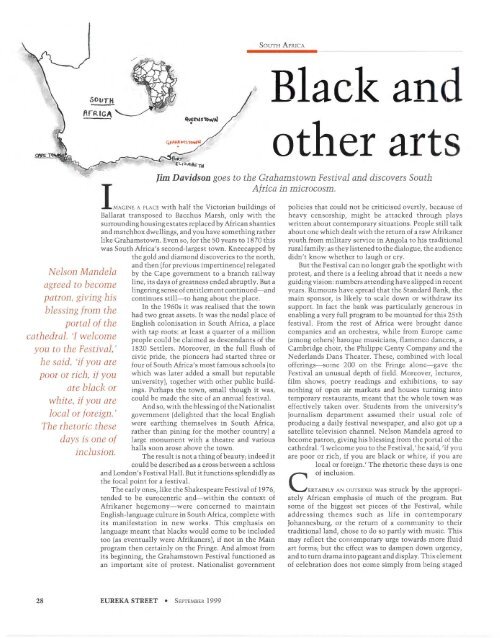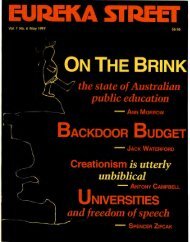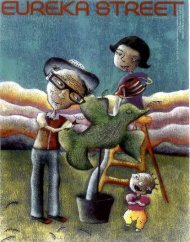SOUTH AFRICABlacl< andother artsNelson Mandelaagreed to becomepatron, giving hisblessing from theportal of thecathedral. 'I welcomeyou to the Festival,'he said, 'if you arepoor or rich, if youare black orwhite, if you arelocal or foreign .'The rhetoric thesedays is one ofinclusion.Jim Davidson goes to the Grahamstown Festival and discovers SouthAfrica in microcosm.IBallarat transposed to Bacchus Marsh, only with theMAG INE A PLAC E with half the Victorian buildings of policies that could not be criticised overtly, because ofh eavy censorship, might be attacked through playssurrounding housing estates replaced by African shanties written about contemporary situations. People still talkand matchbox dwellings, and you have something rather about one which dealt with the return of a raw Afrikanerlike Grahamstown. Even so, for the 50 years to 18 70 this youth from military service in Angola to his traditionalwas South Africa's second-largest town. Kneecapped by rural family: as they listened to the dialogue, the audiencethe gold and diamond discoveries to the north, didn't know whether to laugh or cry.and then (for previous impertinence) relegated But the Festival can no longer grab the spotlight withby the Cape government to a branch railway protest, and there is a feeling abroad that it needs a newline, its clays of greatness ended abruptly. But a guiding vision: numbers attending have slipped in recentlingering sense of entitlement continued-and years. Rumours have spread that the Standard Bank, thecontinues still-to hang about the place. main sponsor, is likely to scale clown or withdraw itsIn the 1960s it was realised that the town support. In fact the bank was particularly generous inhad two great assets. It was the nodal place of enabling a very full program to be mounted for this 25thEnglish colonisation in South Africa, a place festival. From the rest of Africa were brought dancewith tap roots: at least a quarter of a million companies and an orchestra, while from Europe camepeople could be claimed as descendants of the (among others) baroque musicians, flamenco dancers, a1820 Settlers. Moreover, in the full flush of Cambridge choir, the Philippe Genty Company and thecivic pride, the pioneers had started three or Neclerlancls Dans Theater. These, combined with localfour of South Africa's most famous schools (to offerings-some 200 on the Fringe alone- gave thewhich was later added a small but reputable Festival an unusual depth of field. Moreover, lectures,university), together with other public build- film shows, poetry readings and exhibitions, to sayings. Perhaps the town, small though it was, nothing of open air markets and houses turning intocould be made the site of an annual festival. temporary restaurants, meant that the whole town wasAnd so, with the blessing of the Nationalist effectively taken over. Students from the university'sgovernment (delighted that the local English journalism department assumed their usual role ofwere earthing themselves in South Africa, producing a daily festival newspaper, and also got up arather than pining for the mother country) a satellite television channel. Nelson Manclela agreed tolarge monument with a theatre and various become patron, giving his blessing from the portal of thehalls soon arose above the town.cathedral. 'I welcome you to the Festival,' he said, 'if youcThe result is not a thing of beauty; indeed it are poor or rich, if you are black or white, if you arecould be described as a cross between a schlosslocal or foreign.' The rhetoric these clays is oneand London's Festival Hall. But it functions splendidly asof inclusion.the focal point for a festival.The early ones, like the Shakespeare Festival of 1976,ERTAINLY AN OUTSIDER was struck by the appropritencleclto be eurocentric and-within the context of ately African emphasis of much of the program. ButAfrikaner hegemony-were concerned to maintain some of the biggest set pieces of the Festival, whileEnglish-languagecultureinSouthAfrica,completewith addressing themes such as life in contemporaryits manifestation in new works. This emphasis on Johannesburg, or the return of a community to theirlanguage meant that blacks would come to be included traditional land, chose to do so partly with music. Thistoo (as eventually were Afrikaners), if not in the Main may reflect the contemporary urge towards more fluidprogram then certainly on the Fringe. And almost from art forms; but the effect was to dampen clown urgency,its beginning, the Grahamstown Festival functioned as and to turn elrama into pageant and display. This elementan important site of protest. Nationalist government of celebration does not come simply from being staged28 EUREKA STREET • SEPTEMBER 1999
for a festival, and from being able to draw from unaccustomedpots of money. It stem s even more from people notyet being used to hearing the sound of their own voiceson stage. When speech does occur, it often runs the riskof becoming a declaration; of not being shaped sufficientlyto enmesh with the lines of other characters.One production which used musical elements verytellingly was that by Third World Bunfight, as they areengagingly called, in The Prophet. This dealt with theappalling story of the Xhosa cattle killing of 1856-7, acargo cult movement which spread through these partsas blacks hearkened to the prophecies of an 11-year-oldgirl.They destroyed all their corn and cattle so as to readythemselves to be rejoined by warrior ancestors, whereuponthey would be able to drive the white man into thesea. The results were calamitous: anything up to 100,000people may have died in the famine which followed,while white conquest of the region was accelerated. Howthen might such a painful set of events be restaged?Previously the company had taken up another outbreakof hysteria, based on contemporary witchcraft; thatproduction had, from all accounts, rawness and urgency.But this one dealt with a national cataclysm, albeit a longtime ago. A path therefore had to be found w hich, whileallowing a convincing dramatisation, might also havesomething of the character of a requiem, cauterising thewound even as it re-examined it.The drama therefore unfolded liturgically. On enteringthe vast space of the old power station, one noticedseven figures like statues of Rameses seated at intervalsaround the hall; their eyes were sealed. When the Xhosacame on and made for the central podium, they werechildren; the statue figures intoned a monotonous chant.Grown men exchanged roles as ancestors, as warriors,and even as doomed cattle, their path always a circularone trailing through the audience. The prophecies, thanksto amplification and a drooping intonation, were eerie intheir effectiveness, all the m ore so for the massed chantin the background. Later, the steady pace of the piece waspunctured by two bold theatrical m oments. The first waswhen a symbolic sun rose, and the Xhosa held theirbrea th in expectation that it would stop in the middle ofthe sky, as foretold; this Sun did stop, but then moved on.Later, when a second date for the miracle had been given,and more intensive preparations made-echoed here in arising crescendo joined in even by the statue figures- thesun rose again, but this time, before having the chance tomove on, it was knocked sideways. These were realcoups de theiitre, since the intensity of each m om enteclipsed both common sense and historical knowledge.Of course the production was not faultless: often thevoices did not carry sufficiently. But it had a notablesoundness of structure, even if some allusions wereobscure, while the detail could be impeccable. Threewhite children were used as redcoats: as they picked overthe bodies of the dead Xhosa, the tentative character ofnea t, ten-year-old boys suggested nothing so much asvultures.There was not much sense of contemporary issu esbeing addressed. Southern Africa has the world's worstAIDS rates, but so far as I could see the disease wasrepresented only as a gay white problem. Cape Town isprobably the rape capital of the world; but rape too seemsto have been rarely confronted. Even in the cheekyVagina Monologues-a one-woman show put on in thehall of the prim Diocesan School for Girls-it wa largelytransposed to Bosnia. Perhaps the all-pervasive issues ofrace and the need for transformation effectively crowdout all others.Excepting crime, that is. Despite a notable (and rare)police presence at the Festival, a critic was pick pocketedon the very first day-leading to squawking of analtogether different kind-while a visiting dance troupewere rudely awoken by a gang of thieves. The NewYorkers were shocked; but Pieter-Dirk Uys, SouthAfrica's Barry Humphries, would have said: You'rein the Eastern Cape, and this is the provincewhere they've even stolen the deficit. Criminalitywas constantly referred to in the Festival's stageworks. A character in Love, Crime andJohannesburg, a musical with a thin plot strungaround a real-life poet who was jailed for robbinga bank, nihilistically observed that 'There's nohis tory. There's no past. There's no right or wrong.'The show ended with talk of a general amnesty forcriminals, businessmen and politicians (almostinterchangeable commodities), the audiencebeing com forted with the assurance that'Everything will be all right-in a hundred years'time.' M eanwhile, the young black comedianDavid Kau ended his show saying that som epeople would have realised he wasn't a stand-upcomic-and yes, they were right. The smallaudience then found them selvesReaching out, alas,is still fairlysymbolic. Theprograms have beensubstantiallyAfricanised, and tosome degree so havethe performers. Butit must bedepressing for ablack stand-upcomic like David0 confronting a glinting gun. Kau to find himselfplaying to entirelyNE EXP LANA TI ON for the contemporaryomission s is that the past is still there, just beneath white audiences.the surface-and that bits of it still project intothe landscape of South African life. In a m ovingmonologue on the Fringe, Woman in Waiting, MannieManim dealt with the life of a black servant woman . Herconstant marginalisation, as an incidental consequenceof a white madam's capricious change of plans, wasbrought out forcefully. But more theatrically effectivewere the scenes drawn from childhood, when she hadaccompanied her m other (represented by a huge dress) toDurban . There one day she had gone with her to worksinceotherwise they rarely saw each other- and then,when abandoned, went looking for the loo. She found it,only to be bawled out by the white master. Worse, hermother came running, and to the child's consternation,fell into an apologetic heap. When the scene was over,the little girl turned round and said, 'You must be a veryimportant person, Mr Toilet, to be treated in this way.'Then sh e opened the lid. Inside was a dress; of normaldimensions now. Her mother had been cut down to size.It is not only blacks who bear the scars of the past. Itcomes as a bit of a shock to find a m an not yet 30 oldenough to have been conscripted into the old SouthAfrican army. As a morale booster, he and his mates wereVOLUME 9 N UMBER 7 • EUREKA STREET 29
















